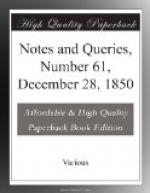So runs the story as far as I remember; the date I cannot recollect. The legend was told me after I had left the church, and I had paid no particular attention to the monument; but I thought at the time that the hand might be only the Ulster badge. I shall be obliged to any of your readers who will throw further light upon this matter. A pilgrimage to Stoke d’Abernon, whose church contains the earliest known brass in England, would not be uninteresting even at this season of the year.
ARUN.
* * * * *
VONDEL’S LUCIFER.
I have to complain of injustice done by a correspondent of “NOTES AND QUERIES,” to the Dutch poet Vondel. To the question mooted by F. (Vol. i. p. 142.), whether my countryman’s Lucifer has ever been translated into English, Hermes answers by a passage taken from the Foreign Quarterly Review for April, 1829; and subjoins a list of the dramatis personae “given from the original Dutch before him. The tragedy itself is condensed by your correspondent into a simple “&c.” Now, if HERMES, instead of referring to a stale review for a comparison between Vondel’s tragedy and the Paradise Lost, without showing by any proof that Milton’s justly renowned epic {508} is indeed superior to this, one of the Dutch poet’s masterpiece—if HERMES, being, as I conclude from his own words, conversant with the language of our Shakspeare, had taken pains to read Lucifer, he would not have repeated a statement unfavourable to Vondel’s poetical genius. I, for my part, will not hazard a judgment on poems so different and yet so alike, I will not sneer at Milton’s demon-gods of Olympus, nor laugh at “their artillery discharged in the daylight of heaven;” for such instances of bad taste are to be considered as clouds setting off the glories of the whole; but this I will say, that Vondel wrote his Lucifer in 1654, the sixty-seventh of his life, while Milton’s Paradise Lost was composed four years later. The honour of precedence, in time, at least, belongs to my countryman. All the odds were against the British poet’s competitor, if one who wrote before him may be so called; for, while Milton enjoyed every privilege of a sound classical education, Vondel had still to begin a course of study when more than twenty-six years of age; and, while the Dutch poet told the price of homely stockings to prosaic burghers, the writer of Paradise Lost was speaking the language of Torquato Tasso in the country enraptured by the first sight of la divina comedia.




